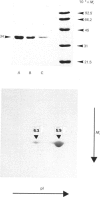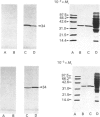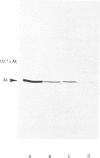Abstract
The properties of 3 alpha-hydroxysteroid/dihydrodiol dehydrogenase from Sprague-Dawley rat liver cytosol have been re-examined in light of several reports which suggest that multiple forms of the enzyme may exist in this tissue. During enzyme purification, chromatography on DE-52 cellulose and chromatofocusing columns indicated the existence of only one form of the protein. Re-chromatography of the purified enzyme by either of these techniques failed to resolve the protein into additional forms. When the purified enzyme was subjected to SDS/polyacrylamide-gel electrophoresis a single band corresponding to Mr 34,000 was detected. Two-dimensional gels showed one predominant protein with a pI of 5.9. Using the homogeneous enzyme as antigen, high-titre polyclonal antibody was raised in rabbits. Western-blot analysis of cytosolic proteins prepared from male and female Sprague-Dawley rat liver indicated the presence of a single immunoreactive band with an Mr of 34,000 in both sexes. All of the 3 alpha-hydroxysteroid dehydrogenase activity present in rat liver cytosol could be immunotitrated with the antibody and the resulting titration curve was superimposable on the titration curve obtained with the purified enzyme. Western-blot analysis of cytosolic proteins prepared from livers of male Wistar and Fischer rats also revealed the presence of a single immunoreactive protein with an Mr of 34,000. These data indicate that, contrary to previous reports, only one form of the dehydrogenase may exist in liver cytosols prepared from a variety of rat strains. Although 3 alpha-hydroxysteroid dehydrogenase activity is known to be widely distributed in male Sprague-Dawley rat tissues, Western blots indicate that only the liver, lung, testis and small intestine contain immunoreactive protein with an Mr of 34,000. The levels of immunoreactive protein in these tissues follow the distribution of dihydrodiol dehydrogenase.
Full text
PDF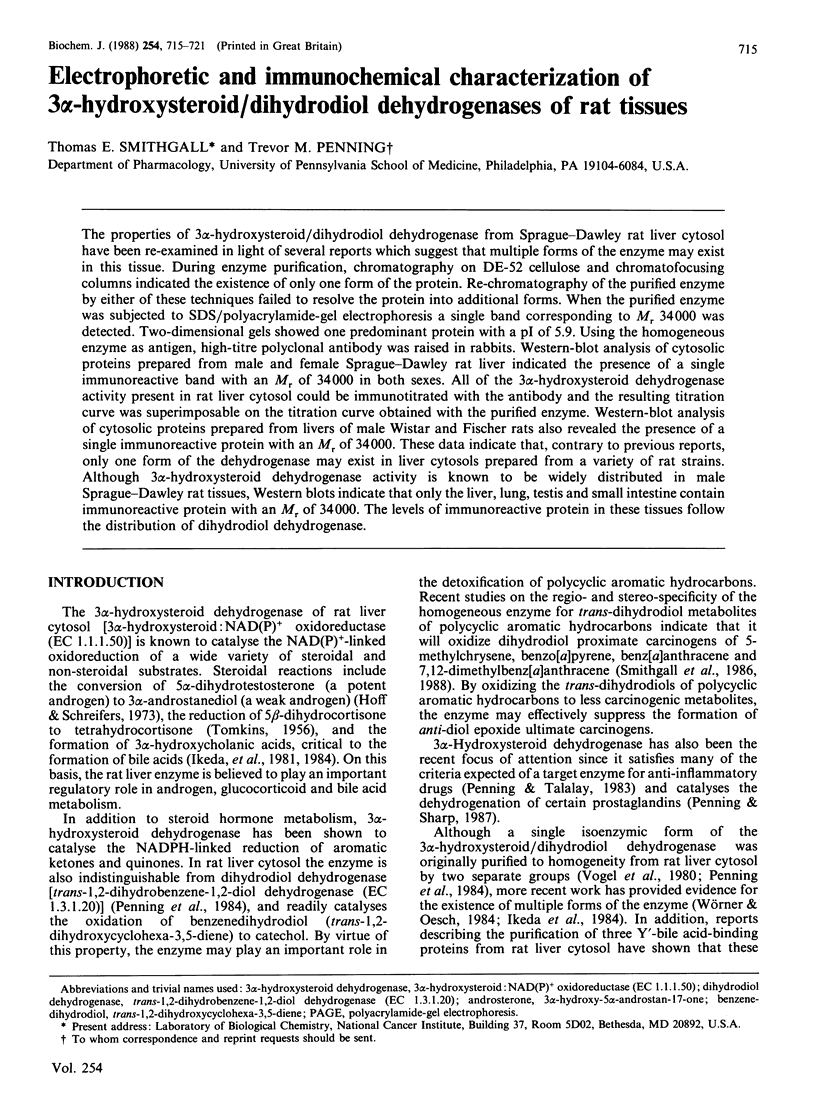
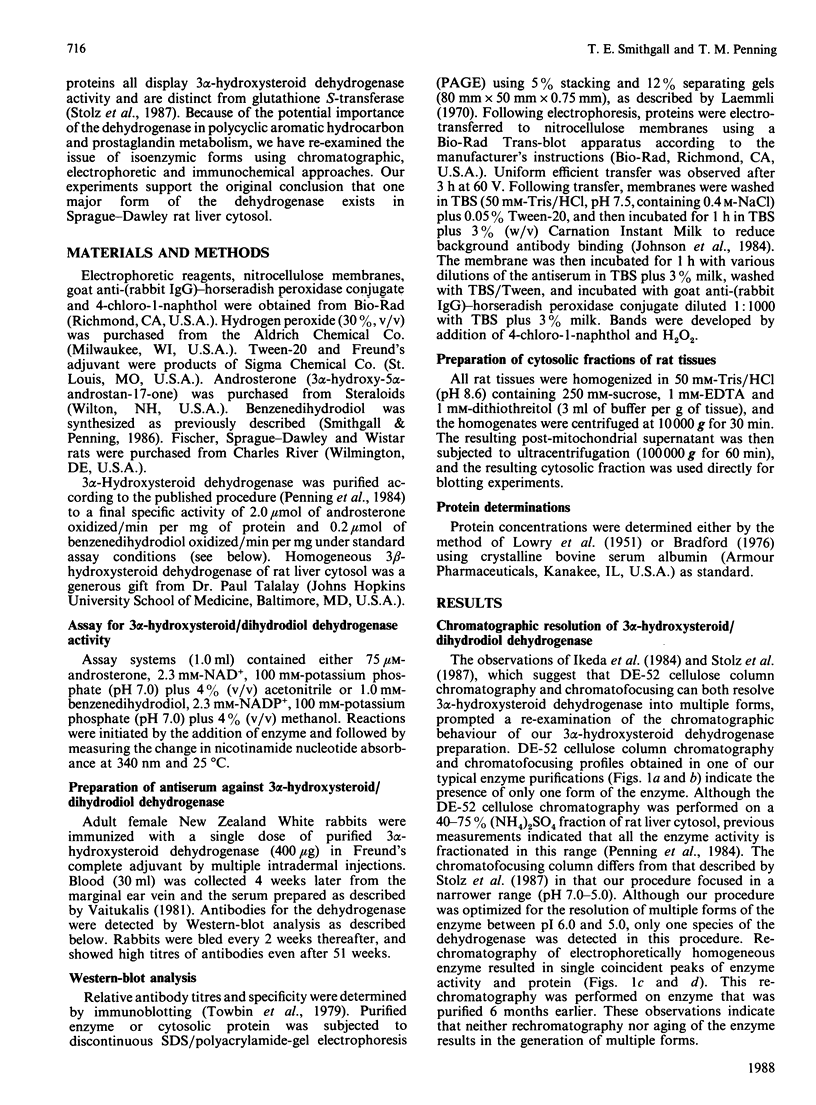
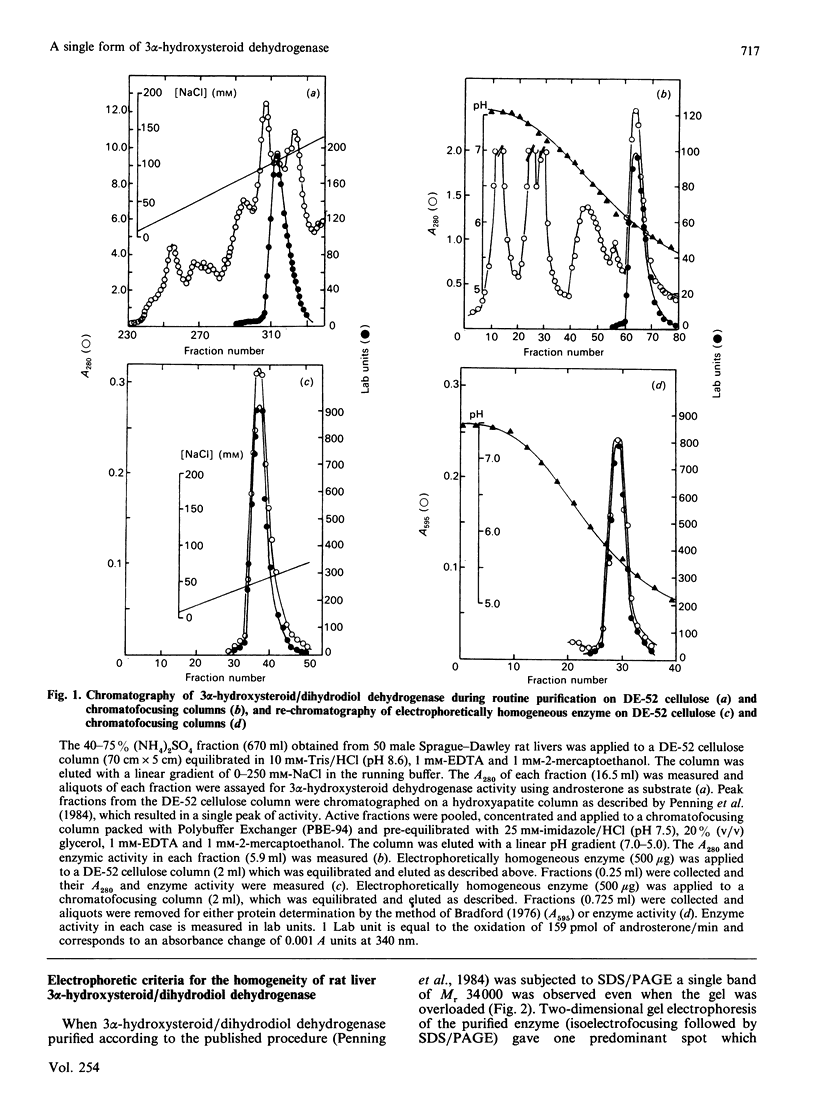
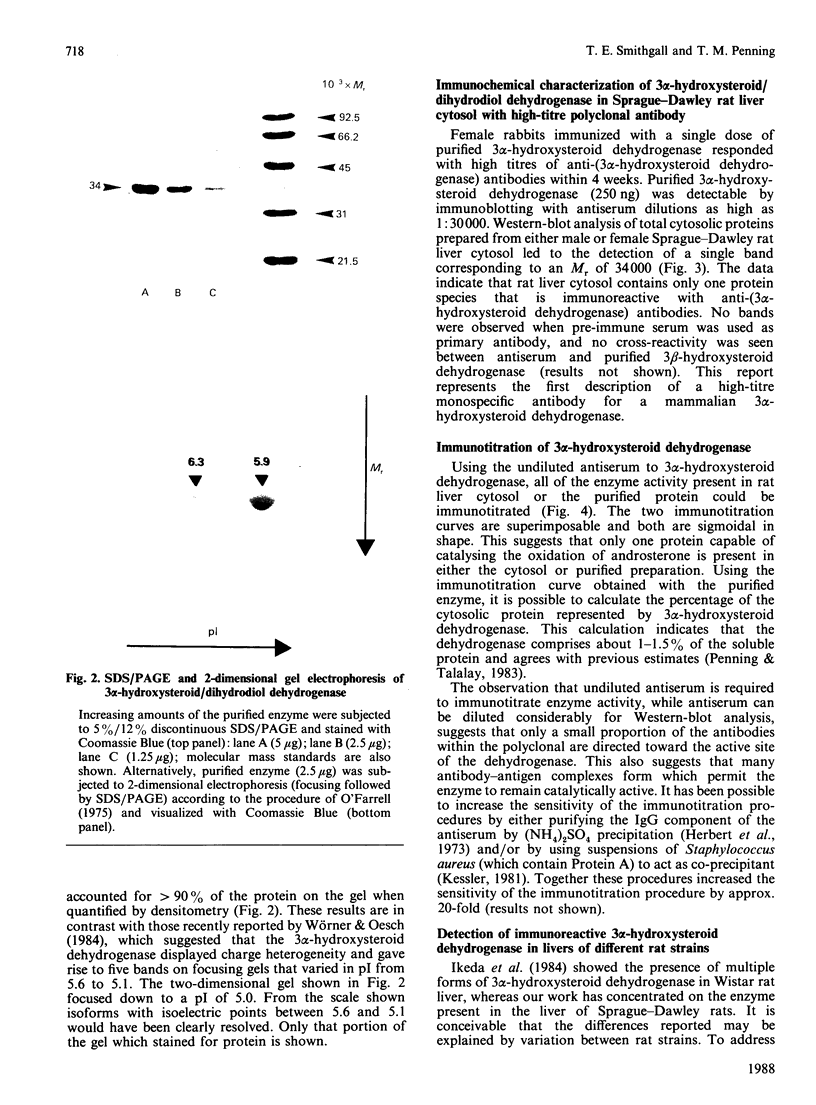
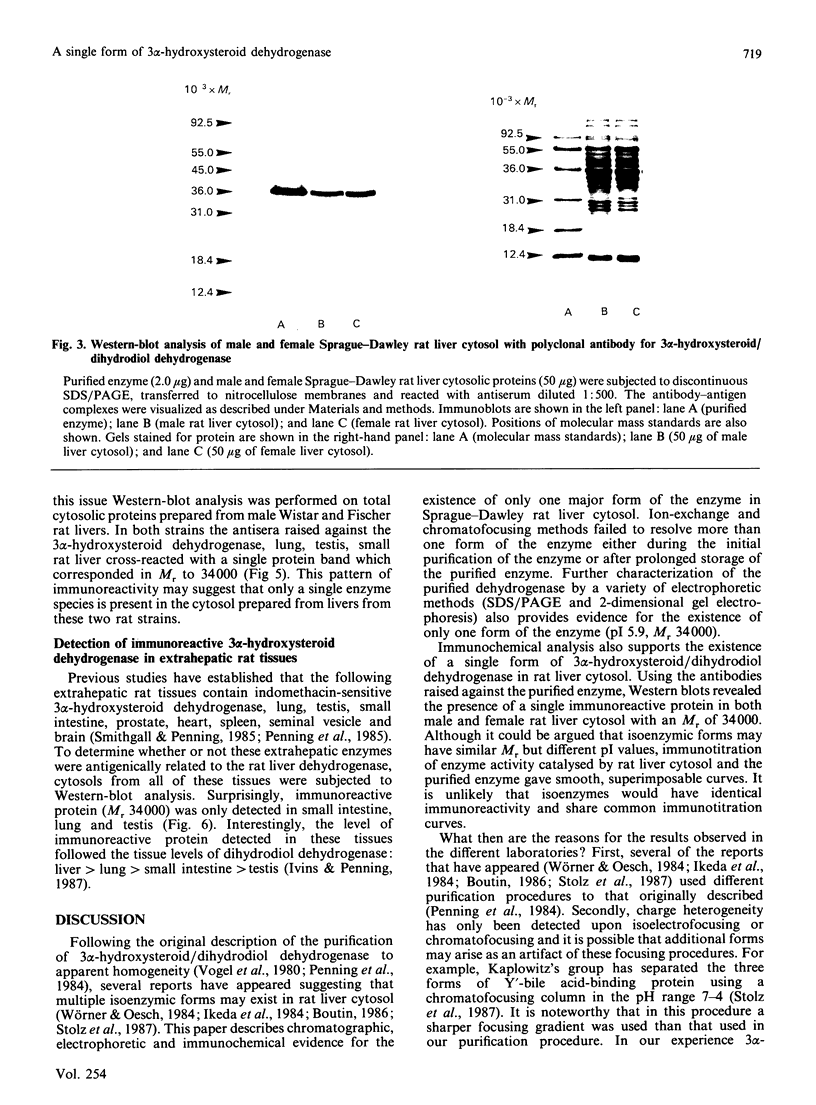
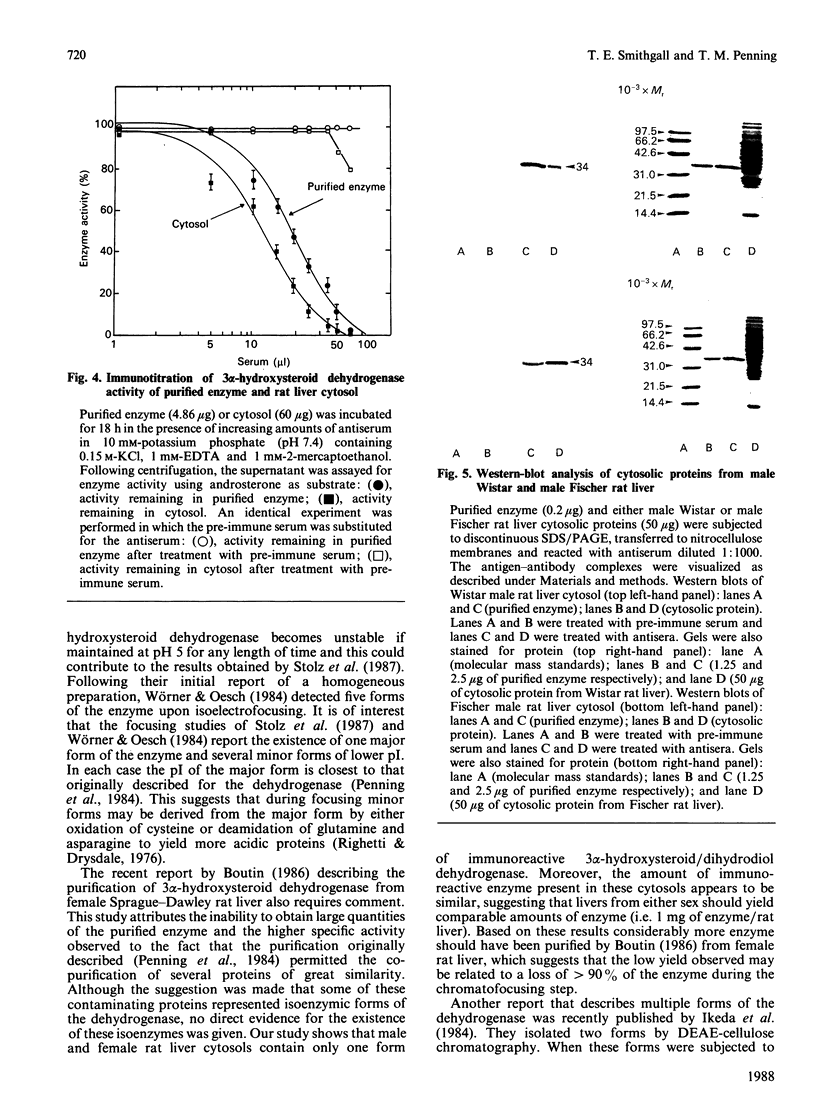
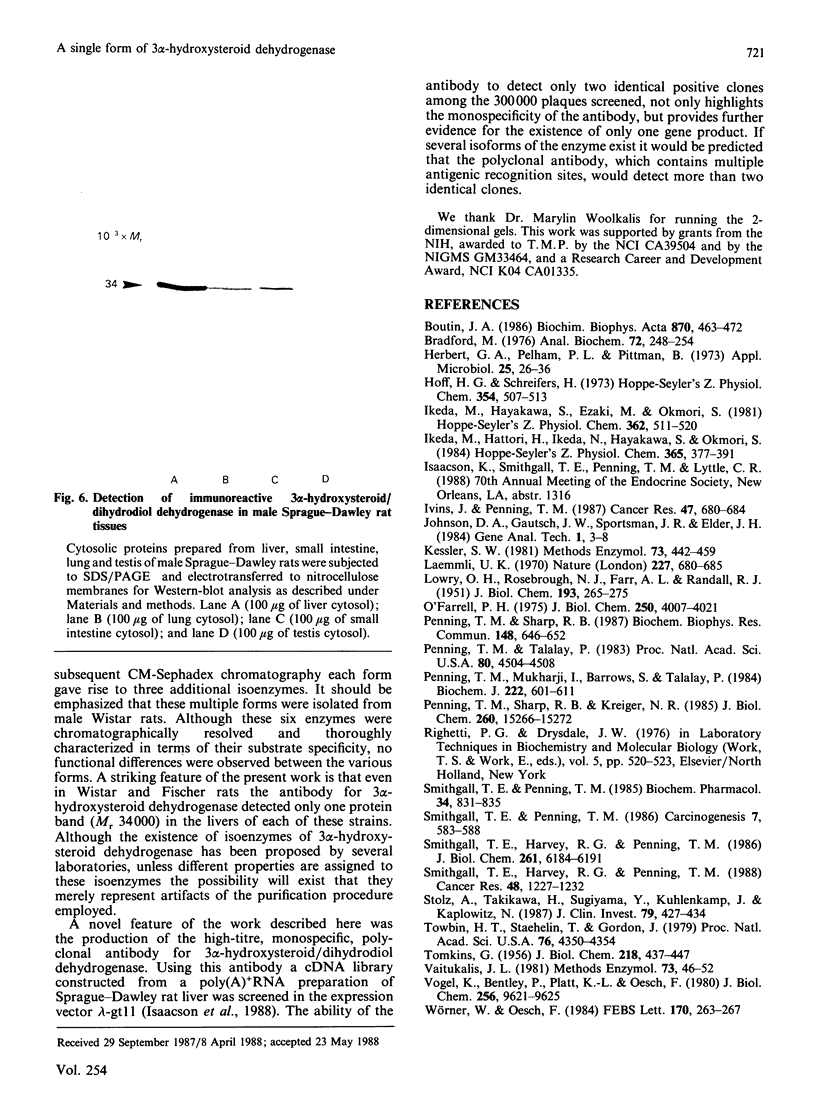
Images in this article
Selected References
These references are in PubMed. This may not be the complete list of references from this article.
- Boutin J. A. Camphoroquinone reduction: another reaction catalyzed by rat liver cytosol 3 alpha-hydroxysteroid dehydrogenase. Biochim Biophys Acta. 1986 Apr 22;870(3):463–472. doi: 10.1016/0167-4838(86)90254-2. [DOI] [PubMed] [Google Scholar]
- Bradford M. M. A rapid and sensitive method for the quantitation of microgram quantities of protein utilizing the principle of protein-dye binding. Anal Biochem. 1976 May 7;72:248–254. doi: 10.1006/abio.1976.9999. [DOI] [PubMed] [Google Scholar]
- Hebert G. A., Pelham P. L., Pittman B. Determination of the optimal ammonium sulfate concentration for the fractionation of rabbit, sheep, horse, and goat antisera. Appl Microbiol. 1973 Jan;25(1):26–36. doi: 10.1128/am.25.1.26-36.1973. [DOI] [PMC free article] [PubMed] [Google Scholar]
- Hoff H. G., Schriefers H. Sexuell differenzierte und sexuell undifferenzierte 3alpha- und 3beta- Hydroxysteroid-Dehydrogenase-Aktivitäten und ihre intrazelluläre Lokalisation in der Rattenleber. Hoppe Seylers Z Physiol Chem. 1973 May;354(5):507–513. [PubMed] [Google Scholar]
- Ikeda M., Hattori H., Ikeda N., Hayakawa S., Ohmori S. Purification and characterization of the multiple forms of 3 alpha-hydroxysteroid dehydrogenase in rat liver cytosol. Hoppe Seylers Z Physiol Chem. 1984 Mar;365(3):377–391. doi: 10.1515/bchm2.1984.365.1.377. [DOI] [PubMed] [Google Scholar]
- Ikeda M., Hayakawa S., Ezaki M., Ohmori S. An NADP-dependent 3 alpha-hydroxysteroid dehydrogenase of rat liver active against C19, C20, C23, C24, C25 and C26 steroids. Hoppe Seylers Z Physiol Chem. 1981 May;362(5):511–520. doi: 10.1515/bchm2.1981.362.1.511. [DOI] [PubMed] [Google Scholar]
- Ivins J. K., Penning T. M. Radiochemical detection of dihydrodiol dehydrogenase: distribution of the enzyme in male Sprague-Dawley rat tissues and its sensitivity to inhibition by indomethacin and 6-medroxyprogesterone acetate. Cancer Res. 1987 Feb 1;47(3):680–684. [PubMed] [Google Scholar]
- Kessler S. W. Use of protein A-bearing staphylococci for the immunoprecipitation and isolation of antigens from cells. Methods Enzymol. 1981;73(Pt B):442–459. doi: 10.1016/0076-6879(81)73084-2. [DOI] [PubMed] [Google Scholar]
- LOWRY O. H., ROSEBROUGH N. J., FARR A. L., RANDALL R. J. Protein measurement with the Folin phenol reagent. J Biol Chem. 1951 Nov;193(1):265–275. [PubMed] [Google Scholar]
- Laemmli U. K. Cleavage of structural proteins during the assembly of the head of bacteriophage T4. Nature. 1970 Aug 15;227(5259):680–685. doi: 10.1038/227680a0. [DOI] [PubMed] [Google Scholar]
- O'Farrell P. H. High resolution two-dimensional electrophoresis of proteins. J Biol Chem. 1975 May 25;250(10):4007–4021. [PMC free article] [PubMed] [Google Scholar]
- Penning T. M., Mukharji I., Barrows S., Talalay P. Purification and properties of a 3 alpha-hydroxysteroid dehydrogenase of rat liver cytosol and its inhibition by anti-inflammatory drugs. Biochem J. 1984 Sep 15;222(3):601–611. doi: 10.1042/bj2220601. [DOI] [PMC free article] [PubMed] [Google Scholar]
- Penning T. M., Sharp R. B., Krieger N. R. Purification and properties of 3 alpha-hydroxysteroid dehydrogenase from rat brain cytosol. Inhibition by nonsteroidal anti-inflammatory drugs and progestins. J Biol Chem. 1985 Dec 5;260(28):15266–15272. [PubMed] [Google Scholar]
- Penning T. M., Sharp R. B. Prostaglandin dehydrogenase activity of purified rat liver 3 alpha-hydroxysteroid dehydrogenase. Biochem Biophys Res Commun. 1987 Oct 29;148(2):646–652. doi: 10.1016/0006-291x(87)90925-9. [DOI] [PubMed] [Google Scholar]
- Penning T. M., Talalay P. Inhibition of a major NAD(P)-linked oxidoreductase from rat liver cytosol by steroidal and nonsteroidal anti-inflammatory agents and by prostaglandins. Proc Natl Acad Sci U S A. 1983 Jul;80(14):4504–4508. doi: 10.1073/pnas.80.14.4504. [DOI] [PMC free article] [PubMed] [Google Scholar]
- Smithgall T. E., Harvey R. G., Penning T. M. Oxidation of the trans-3,4-dihydrodiol metabolites of the potent carcinogen 7,12-dimethylbenz(a)anthracene and other benz(a)anthracene derivatives by 3 alpha-hydroxysteroid-dihydrodiol dehydrogenase: effects of methyl substitution on velocity and stereochemical course of trans-dihydrodiol oxidation. Cancer Res. 1988 Mar 1;48(5):1227–1232. [PubMed] [Google Scholar]
- Smithgall T. E., Harvey R. G., Penning T. M. Regio- and stereospecificity of homogeneous 3 alpha-hydroxysteroid-dihydrodiol dehydrogenase for trans-dihydrodiol metabolites of polycyclic aromatic hydrocarbons. J Biol Chem. 1986 May 15;261(14):6184–6191. [PubMed] [Google Scholar]
- Smithgall T. E., Penning T. M. Indomethacin-sensitive 3 alpha-hydroxysteroid dehydrogenase in rat tissues. Biochem Pharmacol. 1985 Mar 15;34(6):831–835. doi: 10.1016/0006-2952(85)90763-4. [DOI] [PubMed] [Google Scholar]
- Smithgall T. E., Penning T. M. Inhibition of trans-dihydrodiol oxidation by the non-steroidal anti-inflammatory drugs. Carcinogenesis. 1986 Apr;7(4):583–588. doi: 10.1093/carcin/7.4.583. [DOI] [PubMed] [Google Scholar]
- Stolz A., Takikawa H., Sugiyama Y., Kuhlenkamp J., Kaplowitz N. 3 alpha-hydroxysteroid dehydrogenase activity of the Y' bile acid binders in rat liver cytosol. Identification, kinetics, and physiologic significance. J Clin Invest. 1987 Feb;79(2):427–434. doi: 10.1172/JCI112829. [DOI] [PMC free article] [PubMed] [Google Scholar]
- TOMKINS G. M. A mammalian 3alpha-hydroxysteroid dehydrogenase. J Biol Chem. 1956 Jan;218(1):437–447. [PubMed] [Google Scholar]
- Towbin H., Staehelin T., Gordon J. Electrophoretic transfer of proteins from polyacrylamide gels to nitrocellulose sheets: procedure and some applications. Proc Natl Acad Sci U S A. 1979 Sep;76(9):4350–4354. doi: 10.1073/pnas.76.9.4350. [DOI] [PMC free article] [PubMed] [Google Scholar]
- Vaitukaitis J. L. Production of antisera with small doses of immunogen: multiple intradermal injections. Methods Enzymol. 1981;73(Pt B):46–52. doi: 10.1016/0076-6879(81)73055-6. [DOI] [PubMed] [Google Scholar]
- Vogel K., Bentley P., Platt K. L., Oesch F. Rat liver cytoplasmic dihydrodiol dehydrogenase. Purification to apparent homogeneity and properties. J Biol Chem. 1980 Oct 25;255(20):9621–9625. [PubMed] [Google Scholar]
- Wörner W., Oesch F. Identity of dihydrodiol dehydrogenase and 3 alpha-hydroxysteroid dehydrogenase in rat but not in rabbit liver cytosol. FEBS Lett. 1984 May 21;170(2):263–267. doi: 10.1016/0014-5793(84)81325-3. [DOI] [PubMed] [Google Scholar]



